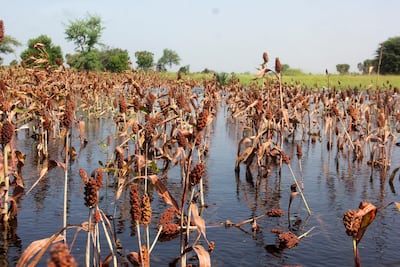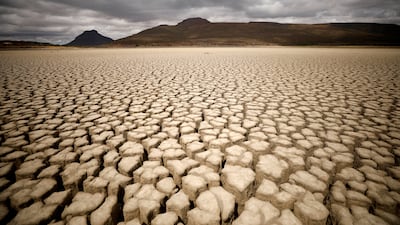Follow the latest news on Cop27 in Egypt
If you are a big city dweller from Ethiopia, Pakistan or Mali, you may well be thankful for the vegetables on your dinner table and fruit for dessert — and grateful to the smallholder who grew them on a tiny plot of land.
While small-scale farmers employ and feed about three billion people around the world, they are also fighting the effects climate change is having on their livelihood. Ironically, they also have a role in combating it.
“Small-scale farmers have the least capability to respond to climate-change challenges,” said Jyotsna Puri of the UN’s International Fund for Agriculture Development (Ifad).
“Clearly, if you want to take any action in regard to climate change, you must make sure that the methods used by small-scale farmers are modified or changed without affecting their production capacity,” she told The National in an interview on the sidelines of the UN climate summit in Egypt.
The threat to small-scale farmers is one of many existential problems posed by climate change, from droughts, rising sea levels and rising temperatures to polluted rivers and animal extinction.
Cop27, the UN climate summit in Egypt, is expected to produce mechanisms to implement resolutions agreed over the years, including measures for industrialised nations, the main gas emitters, to provide funds for other countries.
Ifad’s focus on helping small-scale farmers — the agency defines them as owning or working less than two hectares — around the world is justified, given the disproportionately large contribution they make to the world’s food production.
They farm only 11 per cent of the globe’s agricultural land, but they produce a third of the planet's food.

“They are highly productive, contribute to biodiversity but also produce 5 per cent of the world’s gas emissions,” said Ms Puri, Ifad’s associate vice president in the strategy and knowledge department.
She said small-scale farms are also a major sink for carbon dioxide and use techniques that maintain soil carbon.
The world’s entire agriculture sector produces 24 per cent of all gas emissions, with most going to large-scale agriculture that uses fossil-based fertilisers, pesticides and fuel.
The vital role played by the small-scale farmers, however, is under threat by climate change: desertification in many parts of Africa and flooding in Asia are affecting the world’s food supplies and pushing farmers away from their land to become “climate refugees”.
In eastern and southern Africa, for example, key crop yields were expected to drop by up to 80 per cent in coming years, primarily because of weather shocks and increased deforestation, she said.
She said Ifad was working to increase the resilience of small-scale farmers in the face of climate change and help them adopt new methods that will reduce gas emissions.
Ms Puri bemoaned the lack of international funds set aside for what climate experts call adaptation. She said that of the $340 billion needed, only $70bn was available.
“We want money and data, too,” she said. “We need more data, but there isn’t enough commitment to collect more data.”














































